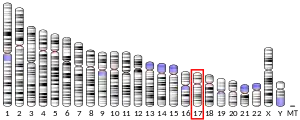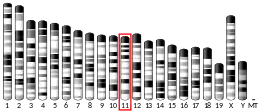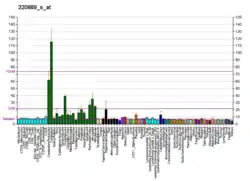CA10
Carbonic anhydrase-related protein 10 is an enzyme that in humans is encoded by the CA10 gene.[5][6][7]
| CA10 | |||||||||||||||||||||||||||||||||||||||||||||||||||
|---|---|---|---|---|---|---|---|---|---|---|---|---|---|---|---|---|---|---|---|---|---|---|---|---|---|---|---|---|---|---|---|---|---|---|---|---|---|---|---|---|---|---|---|---|---|---|---|---|---|---|---|
| Identifiers | |||||||||||||||||||||||||||||||||||||||||||||||||||
| Aliases | CA10, CA-RPX, CARPX, HUCEP-15, carbonic anhydrase 10 | ||||||||||||||||||||||||||||||||||||||||||||||||||
| External IDs | OMIM: 604642 MGI: 1919855 HomoloGene: 23201 GeneCards: CA10 | ||||||||||||||||||||||||||||||||||||||||||||||||||
| |||||||||||||||||||||||||||||||||||||||||||||||||||
| |||||||||||||||||||||||||||||||||||||||||||||||||||
| |||||||||||||||||||||||||||||||||||||||||||||||||||
| |||||||||||||||||||||||||||||||||||||||||||||||||||
| |||||||||||||||||||||||||||||||||||||||||||||||||||
| Wikidata | |||||||||||||||||||||||||||||||||||||||||||||||||||
| |||||||||||||||||||||||||||||||||||||||||||||||||||
This gene encodes a protein that belongs to the carbonic anhydrase family of zinc metalloenzymes, which catalyze the reversible hydration of carbon dioxide in various biological processes. The protein encoded by this gene is an acatalytic member of the alpha-carbonic anhydrase subgroup, and it is thought to play a role in the central nervous system, especially in brain development. Multiple transcript variants encoding the same protein have been found for this gene.[7]
References
- GRCh38: Ensembl release 89: ENSG00000154975 - Ensembl, May 2017
- GRCm38: Ensembl release 89: ENSMUSG00000056158 - Ensembl, May 2017
- "Human PubMed Reference:". National Center for Biotechnology Information, U.S. National Library of Medicine.
- "Mouse PubMed Reference:". National Center for Biotechnology Information, U.S. National Library of Medicine.
- Hewett-Emmett D, Tashian RE (Aug 1996). "Functional diversity, conservation, and convergence in the evolution of the alpha-, beta-, and gamma-carbonic anhydrase gene families". Mol Phylogenet Evol. 5 (1): 50–77. doi:10.1006/mpev.1996.0006. PMID 8673298.
- Kleiderlein JJ, Nisson PE, Jessee J, Li WB, Becker KG, Derby ML, Ross CA, Margolis RL (Feb 1999). "CCG repeats in cDNAs from human brain". Hum Genet. 103 (6): 666–73. doi:10.1007/s004390050889. PMID 9921901. S2CID 23696667.
- "Entrez Gene: CA10 carbonic anhydrase X".
External links
- Human CA10 genome location and CA10 gene details page in the UCSC Genome Browser.
Further reading
- Supuran CT, Scozzafava A, Casini A (2003). "Carbonic anhydrase inhibitors". Med Res Rev. 23 (2): 146–89. doi:10.1002/med.10025. PMID 12500287. S2CID 90349277.
- Supuran CT, Vullo D, Manole G, et al. (2005). "Designing of novel carbonic anhydrase inhibitors and activators". Curr Med Chem Cardiovasc Hematol Agents. 2 (1): 49–68. doi:10.2174/1568016043477305. PMID 15328829.
- Pastorekova S, Parkkila S, Pastorek J, Supuran CT (2004). "Carbonic anhydrases: current state of the art, therapeutic applications and future prospects". J Enzyme Inhib Med Chem. 19 (3): 199–229. doi:10.1080/14756360410001689540. PMID 15499993. S2CID 218868129.
- Wiemann S, Weil B, Wellenreuther R, et al. (2001). "Toward a catalog of human genes and proteins: sequencing and analysis of 500 novel complete protein coding human cDNAs". Genome Res. 11 (3): 422–35. doi:10.1101/gr.GR1547R. PMC 311072. PMID 11230166.
- Okamoto N, Fujikawa-Adachi K, Nishimori I, et al. (2001). "cDNA sequence of human carbonic anhydrase-related protein, CA-RP X: mRNA expressions of CA-RP X and XI in human brain". Biochim. Biophys. Acta. 1518 (3): 311–6. doi:10.1016/s0167-4781(01)00193-2. PMID 11311946.
- Taniuchi K, Nishimori I, Takeuchi T, et al. (2002). "Developmental expression of carbonic anhydrase-related proteins VIII, X, and XI in the human brain". Neuroscience. 112 (1): 93–9. doi:10.1016/S0306-4522(02)00066-0. PMID 12044474. S2CID 31186391.
- Strausberg RL, Feingold EA, Grouse LH, et al. (2003). "Generation and initial analysis of more than 15,000 full-length human and mouse cDNA sequences". Proc. Natl. Acad. Sci. U.S.A. 99 (26): 16899–903. Bibcode:2002PNAS...9916899M. doi:10.1073/pnas.242603899. PMC 139241. PMID 12477932.
- Clark HF, Gurney AL, Abaya E, et al. (2003). "The secreted protein discovery initiative (SPDI), a large-scale effort to identify novel human secreted and transmembrane proteins: a bioinformatics assessment". Genome Res. 13 (10): 2265–70. doi:10.1101/gr.1293003. PMC 403697. PMID 12975309.
- Gerhard DS, Wagner L, Feingold EA, et al. (2004). "The status, quality, and expansion of the NIH full-length cDNA project: the Mammalian Gene Collection (MGC)". Genome Res. 14 (10B): 2121–7. doi:10.1101/gr.2596504. PMC 528928. PMID 15489334.
- Kimura K, Wakamatsu A, Suzuki Y, et al. (2006). "Diversification of transcriptional modulation: large-scale identification and characterization of putative alternative promoters of human genes". Genome Res. 16 (1): 55–65. doi:10.1101/gr.4039406. PMC 1356129. PMID 16344560.
- Olsen JV, Blagoev B, Gnad F, et al. (2006). "Global, in vivo, and site-specific phosphorylation dynamics in signaling networks". Cell. 127 (3): 635–48. doi:10.1016/j.cell.2006.09.026. PMID 17081983. S2CID 7827573.
This article is issued from Wikipedia. The text is licensed under Creative Commons - Attribution - Sharealike. Additional terms may apply for the media files.




